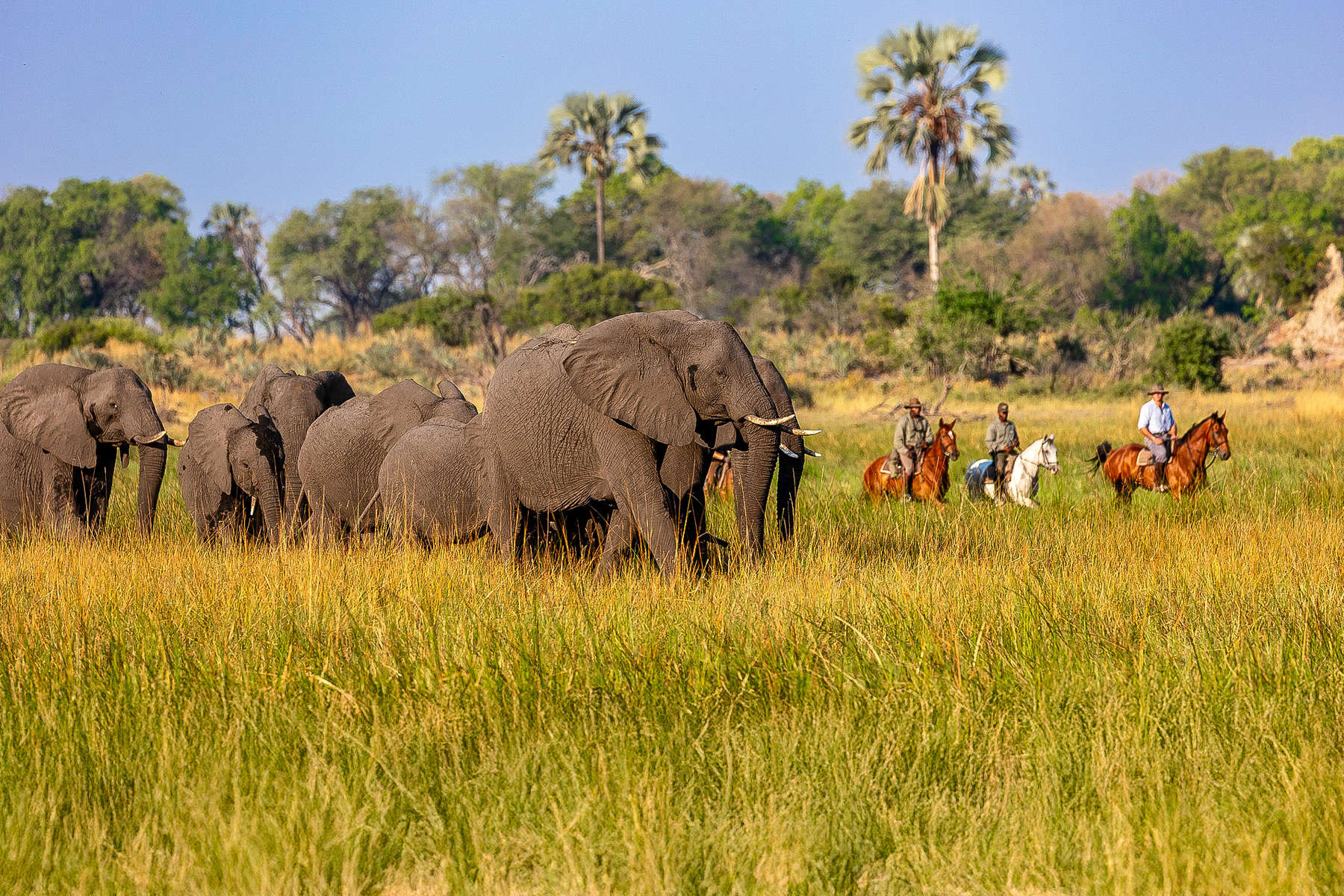
From the horse’s mouth
-
MacatooOctober 2025 Rachel aged 39I had the most wonderful time at Macatoo--it exceeded my expectations in every way. All of the staff are so kind, the horses are wonderful and clearly well-cared for, the accommodations are gorgeous, and being that close to wildlife--on horseback!--is the experience of a lifetime. The limited number of guests provides... Read all
-
MacatooApril 2025 Stacie aged 35I had most amazing time at Macatoo, the whole team were great and the newly refurbished camp is very comfortable. Getting up close with the game on rides was something I won’t forget, and I loved the splashy canters. It’s a really special place and I will definitely return. I rode Masisi and Sembai who were both great... Read all
-
MacatooDecember 2024 Christine aged 56This riding safari was the trip of a lifetime for us. We saw so many safari animals "out in the wild", the horses were wonderful and the riding as advertised - fun and fast, the staff (from camp manager Katie to our guide Bernie to the grooms, housekeeping, servers and everyone in between) were amazing. Even the... Read all
-
MacatooAugust 2024 Arianna aged 31Definitely, the most beautiful trip I have ever taken. For the people met and the places seen. We were lucky to see as so many animals as possible and the splashy canters will remain in my memory forever. There are horses for every type of rider and the staff will do everything to find the right one for you. The food... Read all
-
MacatooApril 2024 Maria aged 54Trip of a lifetime. Superb from start to finish.
-
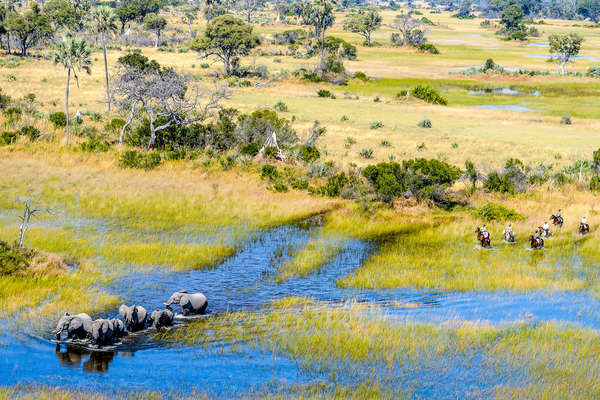
An exciting riding safari in the Okavango Delta -
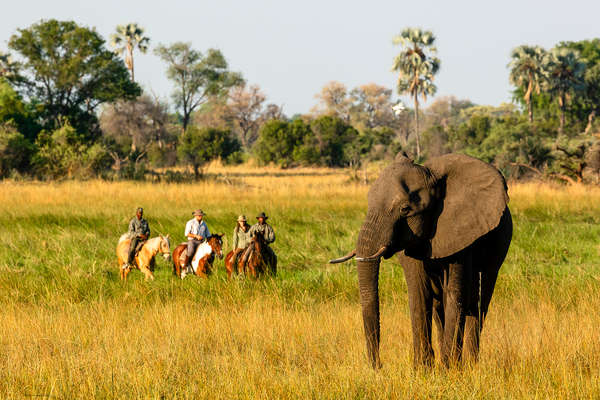
Macatoo Camp - Horseback safari in the Okavango Delta -
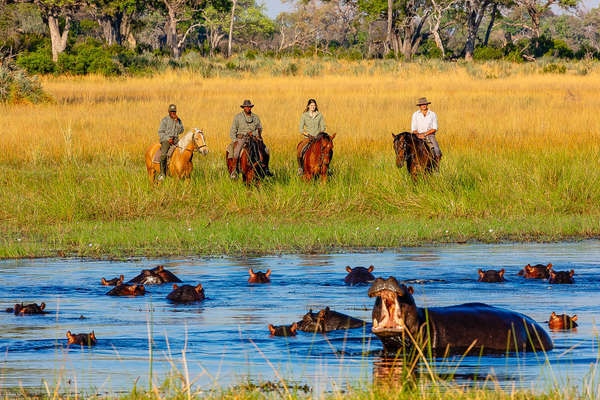
Macatoo Camp - Horseback safari in the Okavango Delta -
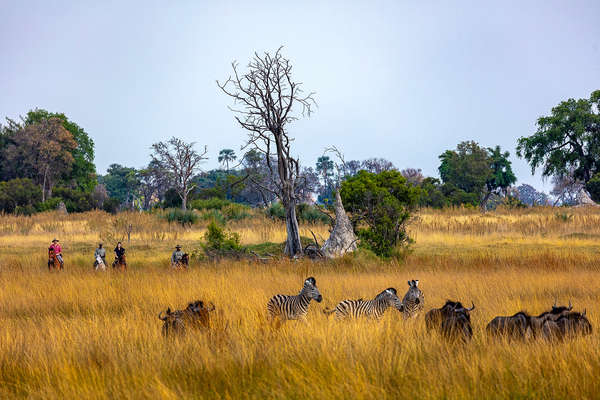
Macatoo Camp - Horseback safari in the Okavango Delta -

Botswana Macatoo camp horseback safari -
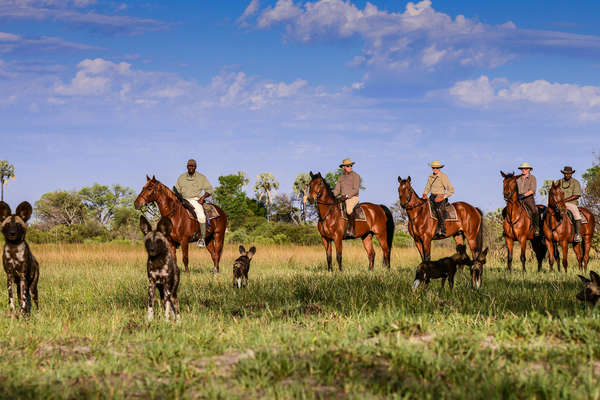
Watching wild dogs from horseback -
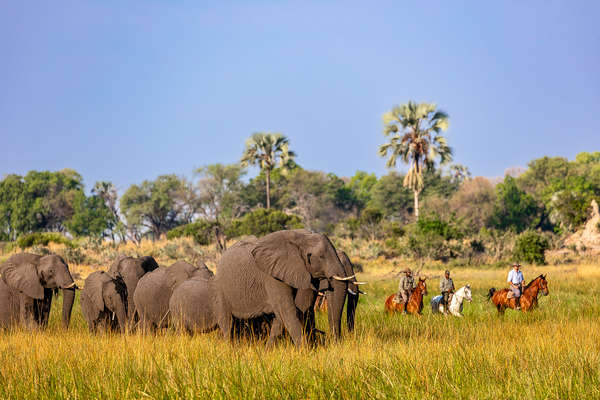
Macatoo Camp - Horseback safari in the Okavango Delta -

Botswana Macatoo camp horseback safari -
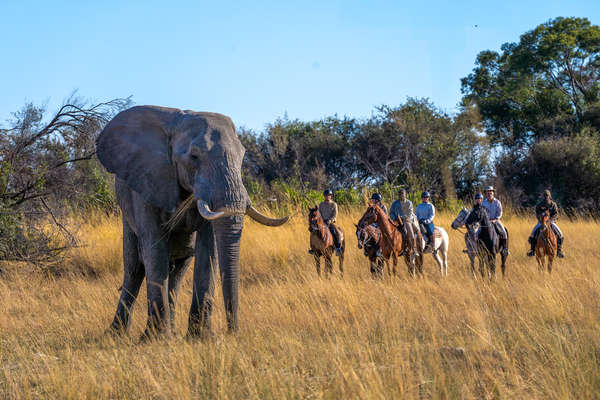
Botswana Macatoo camp horseback safari -
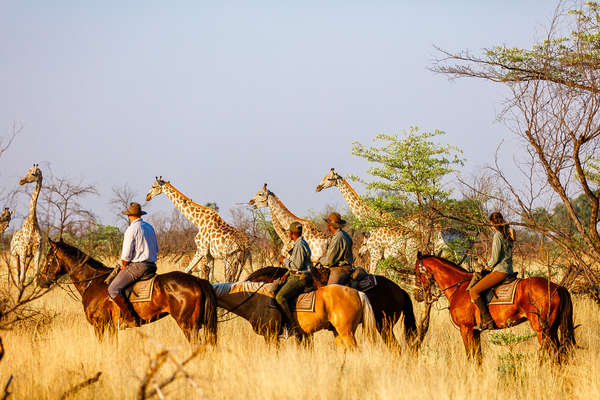
Macatoo Camp - Horseback safari in the Okavango Delta -

Botswana Macatoo camp horseback safari -

Botswana Macatoo camp horseback safari -
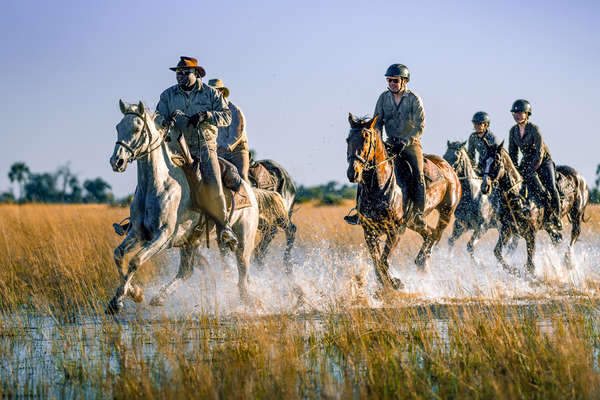
Botswana Macatoo camp horseback safari -
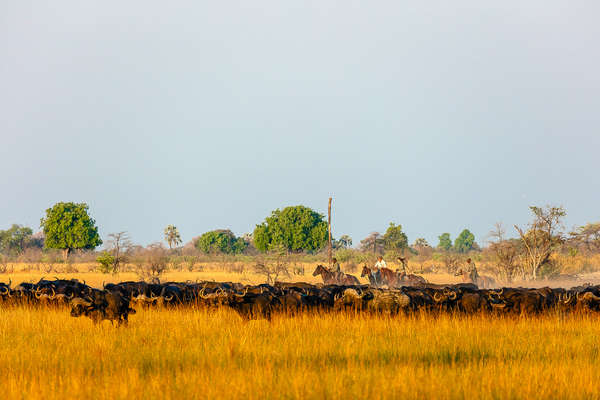
Macatoo Camp - Horseback safari in the Okavango Delta -

Botswana Macatoo camp horseback safari
Itinerary
Highlights
-An intimate safari experience with only 16 guests and a maximum of 8 riders in each riding group, all on a private concession in excess of 200,000 hectares.
-Quality horses and a pacey ride to include a number of long canters and gallops, as well as the possibility to swim across deep channels (flood season).
-Light aircraft transfer into camp, with the chance to view game herds from the air (30 mins each way).
-Recently renovated camp (2025) offering luxurious tents on raised platforms, each with a view across the floodplains.
-Accompanying non-riders are welcomed and are offered walking, boat or vehicle safaris (dependent on water levels) and a 10% discount.
-Arrival/departure days are flexible and you can stay for as long as you like (minimum 3 nights).
-
Day 1 1: HOME - JOHANNESBURG
International flight overnight to Johannesburg. If booking your own flight then you need to depart London for instance (or another European hub) at c. 19:00 so that you arrive in Johannesburg at c. 07:00 in time for your flight to Maun which will depart Johannesburg at c. 11am.
These flights are not included but we can book them for you on request. -
Day 2 2 : JOHANNESBURG - MAUN - CAMP - 2 hours riding
Macatoo campOn arrival in Maun you will be met at the airport by a representative of Macatoo camp holding a sign saying African Horseback Safaris. You will be escorted to your light aircraft for the transfer into camp - a journey of c. 30 minutes and offering a birds eye view of the Okavango Delta. Please note that there is a luggage limit of 20kg on the light aircraft, which includes your hand luggage and must be in soft sided bags.
Important: bookings of seven nights and more receive a 50% discount on aircraft transfers. Bookings of 10 nights and more receive complimentary transfers.
On landing at Cement airstrip it is a short game drive or boat ride (depending on water levels) into camp which is situated on the edge of a seasonal flood plain. After a quick lunch under the trees, there is usually time for a short siesta before the evening ride where you can get to know your horse. You return to camp for a hot shower and candle-lit safari dinner.
IMPORTANT This is a sample itinerary. The actual itinerary will depend on game movements, water levels and weather conditions but always with your best interests at heart. -
Day 3 3 : Okavango Delta - 6 hours riding
Macatoo campYou will be woken before dawn with a cup of tea or coffee in bed. After a light breakfast of toast and muesli you will set out on your first full mornings ride. Depending on the season this may involve some long canters, swimming through the flood waters or pushing-on through seas of tall grass following giraffe, zebra, antelope, elephant, buffalo or whatever's out there. After approximately four hours you head back to camp for lunch with the guides and there's usually some wine to encourage a little siesta through the midday heat. The evening ride is deliberately slower-paced and it's a good opportunity to ask questions and take photographs. Leopard sightings are not infrequent, the bird-life is some of the best in the world and towards sunset there is often elephant or hippo interaction to observe. A sun downer can be enjoyed out in the bush before riding back to camp to freshen up. There's no guarantee that dinner is always eaten in the same place... -
Day 4 4 : Okavango Delta - 4-6 hours riding
Macatoo campWake up as normal with freshly-brewed coffee or tea and depending on your wishes, either ride out again, perhaps to find the rare semi-aquatic antelope, the red lechwe, or join one of the guided walks, game drives or perhaps a spot of fishing for bream from the boat? The riders and non-riders will meet up for breakfast under one of the large baobab trees. After lunch take the opportunity to relax and either swim in the pool, read a book or watch the wildlife from your verandah. Homemade tea and cake is followed by the sunset ride, exploring the lower flood plains where elephant often gather at a pool. As dusk closes in, it is fascinating to watch them interact and being on horseback brings you that much closer. -
Day 5 5 : Okavango Delta - 4-6 hours riding
Macatoo campTodays ride heads out through different country, making your way through clouds of bushman hair grass to plains dotted with fig trees. You might encounter giraffe or shyer antelope while passing through mopane woodlands. Your pace increases as you break out onto the flood plains, often disturbing troops of baboons.
Return to the camp for an afternoon spent at leisure, or the possibility of hiring a helicopter for an hour to gain access to remote and otherwise totally inaccessible parts of the delta with spectacular photographic results (additional cost, payable locally). Finish off the day with a night drive by spotlight, where the resident clan of hyena are often spotted. Bushbabies may leap from branch to branch through the terminalia and acacia trees - only seen by the brights of their eyes. If you are lucky, the spotlight will pick up the glint of a leopard's sultry stare... -
Day 6 6 : Okavango Delta - 6 hours riding
Macatoo Tree campThis morning ride deeper into the heart of the delta, along some of the high palm islands which offer great sweeping views of the Delta plains. After tea, it's a short drive to Macatoo's magical tree house where you will have the option to spend the night out, sleeping high up in the tree tops under the stars. To be out in the wilderness so freely in the Okavango bush like this is a wonderful opportunity and one that few people experience.
Please note: the Tree House is an option and depends on availability. If you decide to spend a night at the Tree House, it is likely you will miss the afternoon ride and the following day morning ride. -
Day 7 7 : Okavango Delta - 4-6 hours
Macatoo campAfter waking amongst the trees to the call of the African Fish Eagle it's a short boat ride back to camp to meet the horses. Splash through water on the vast open plains, home to blue wildebeeste and Burchell's zebra. The riding may be fast as you approach deep reedy areas full of bird life including open-billed storks, squacco herons, slaty egrets, egyptian geese and many more. Return to Macatoo camp along the myriad of waterways lined with large trees for a hearty lunch followed by the option of an afternoon ride, night drive, mokoro or boating trip. -
Day 8 8 : Okavango Delta - 6 hours riding
Macatoo campYour last full day of riding in this magical place takes you cantering through the shallow flood plains, admiring the deeper pools of lilies. Here, the buffalo can gather in large numbers (anything between a dozen and 2000 individuals) and you can try to creep up on them using the islands as cover. The evening offers a last quiet ride with memorable smells of wild sage and the warm African dust as the sun goes down. Your farewell dinner is sure to be a memorable one with another surprise location in store. -
Day 9 9 : MACATOO - MAUN - JOHANNESBURG - 2-3 hours
Time allowing, for your final ride head along some of the high palm islands which offer great sweeping views of the Delta plains. Maybe take a final exhilarating gallop and run with the game before returning to camp for brunch and a quick shower.
You are transferred by light aircraft back to Maun in time for your flight. You will need the afternoon flight from Maun to Johannesburg which departs at c. 2pm. You will then require a flight back to the UK which departs in the evening, at c. 8pm.
Please note departures to Kasane are earlier and do not allow for morning activities. -
Day 10 10: HOME
You will likely arrive home in the morning.
Dates & prices
Price details
- You will also require light aircraft transfers from Maun to camp, which are £300/€350/$385 per person each way in 2025 / £305/€360/$390 per person each way in 2026.
It is also possible to fly into camp from Kasane (if visiting Victoria Falls) and transfers from Kasane are £420/€490/$530 per person each way in 2025 / £430/€500/$535 per person each way in 2025.
PLEASE NOTE:
- Bookings of seven nights and more receive a 50% discount on transfers (Maun). Bookings of 10 nights and more receive complimentary transfers.
- If flying out of or into Kasane, there will be no activities on arrival/departure
- Dates are flexible and you can arrive/depart on any day. We recommend a stay of 7 nights, but it is possible to stay for as little as three nights and as many as ten nights. Please enquire for prices for shorter/longer stays.
- Macatoo camp can accommodate 16 people and there are usually two riding groups with 7/8 riders in each group.
- There is no single supplement if you are willing to share a tent with another guest of the same sex. To guarantee your own tent there is a single supplement of 50%. There is one tent which is available to single travellers with no single supplement and this is allocated on a first come, first served basis.
- A conservation donation of GBP 10 per person, per night, will be added to your invoice to support conservation projects and anti-poaching efforts in the Okavango Delta. Should any guest prefer not to contribute, they may request the removal of the donation from their booking before confirmation. Please note that donations are non-refundable once the booking is confirmed.
- Children over the age of 12 years are welcome at Macatoo camp but they must be good riders and accompanied by an adult throughout. Please note that they will be riding in an area of potentially dangerous game and so it is imperative that they can stay on their horse, ride out of danger at speed if required and take commands from the guide. There is no discount for children.
- The usual weight limit is 95kgs. There are one or two horses capable of carrying between 95kgs - 105 kgs but these are subject to availability, so please check with us if you weigh more than 95kgs.
- If you have previously visited Macatoo camp and are re-booking within 12 months then you may be eligible for a 5% discount.
- Accompanying non-riders will be offered non-riding activities to include game walks, game drives, boat trips, mokoros and fishing (dependent on water levels). Non-riders are eligible for a 10% discount on the accommodation rate.
- There is one honeymoon tent, complete with a bath on a raised platform and larger private deck. This tent is available at a surcharge of £190/€220/$240 in 2025 / £200/€230/$260 in 2025.
Please Note
The itinerary may be modified at anytime for security reasons, meteorological or events beyond our control such as blocked roads, rivers in flood, drought, strikes and local holidays. Equus Journeys, our local partners and their local guides will always strive to find the best solution and will alter the itinerary as needed.
The names of the hotels and accommodation are given for information only and depending on availability, they may be modified without notice and replaced by another of a similar standard.
Price includes
Support Team
1 back-up guide
Accommodation
Meals
Snacks and beverages (including wine and alcoholic beverages)
Price doesn't include
Transports
International flights to Maun
Extra
Insurance
Optional
Accommodation
Extras
-
Departure Return Price without flights Status 30/01/2026 08/02/2026 £4,592 €5,235 $5,924 Contact an advisor 06/02/2026 15/02/2026 £4,592 €5,235 $5,924 Book now 13/02/2026 22/02/2026 £4,592 €5,235 $5,924 Book now 20/02/2026 01/03/2026 £4,592 €5,235 $5,924 Book now 27/02/2026 08/03/2026 £4,592 €5,235 $5,924 Book now -
Departure Return Price without flights Status 06/03/2026 15/03/2026 £4,592 €5,235 $5,924 Book now 13/03/2026 22/03/2026 £4,592 €5,235 $5,924 Book now 20/03/2026 29/03/2026 £4,592 €5,235 $5,924 Book now 27/03/2026 05/04/2026 £5,204 €5,933 $6,713 Book now 03/04/2026 12/04/2026 £6,020 €6,863 $7,766 Book now 10/04/2026 19/04/2026 £6,020 €6,863 $7,766 Book now 17/04/2026 26/04/2026 £6,020 €6,863 $7,766 Book now 24/04/2026 03/05/2026 £6,020 €6,863 $7,766 Book now -
Departure Return Price without flights Status 01/05/2026 10/05/2026 £6,020 €6,863 $7,766 Book now 08/05/2026 17/05/2026 £6,020 €6,863 $7,766 Book now 15/05/2026 24/05/2026 £6,020 €6,863 $7,766 Book now 22/05/2026 31/05/2026 £6,020 €6,863 $7,766 Book now 29/05/2026 07/06/2026 £6,020 €6,863 $7,766 Book now 05/06/2026 14/06/2026 £6,020 €6,863 $7,766 Book now 12/06/2026 21/06/2026 £6,545 €7,461 $8,443 Book now 19/06/2026 28/06/2026 £7,245 €8,259 $9,346 Book now 26/06/2026 05/07/2026 £7,245 €8,259 $9,346 Book now -
Departure Return Price without flights Status 03/07/2026 12/07/2026 £7,245 €8,259 $9,346 Book now 10/07/2026 19/07/2026 £7,245 €8,259 $9,346 Book now 17/07/2026 26/07/2026 £7,245 €8,259 $9,346 Book now 24/07/2026 02/08/2026 £7,245 €8,259 $9,346 Book now 31/07/2026 09/08/2026 £7,245 €8,259 $9,346 Book now 07/08/2026 16/08/2026 £7,245 €8,259 $9,346 Book now 14/08/2026 23/08/2026 £7,245 €8,259 $9,346 Book now 21/08/2026 30/08/2026 £7,245 €8,259 $9,346 Book now 28/08/2026 06/09/2026 £7,245 €8,259 $9,346 Book now -
Departure Return Price without flights Status 04/09/2026 13/09/2026 £7,245 €8,259 $9,346 Book now 11/09/2026 20/09/2026 £7,245 €8,259 $9,346 Book now 18/09/2026 27/09/2026 £7,245 €8,259 $9,346 Book now 25/09/2026 04/10/2026 £7,245 €8,259 $9,346 Book now 02/10/2026 11/10/2026 £7,245 €8,259 $9,346 Book now 09/10/2026 18/10/2026 £6,895 €7,860 $8,895 Book now 16/10/2026 25/10/2026 £6,020 €6,863 $7,766 Book now 23/10/2026 01/11/2026 £6,020 €6,863 $7,766 Book now 30/10/2026 08/11/2026 £6,020 €6,863 $7,766 Book now -
Departure Return Price without flights Status 06/11/2026 15/11/2026 £6,020 €6,863 $7,766 Book now 13/11/2026 22/11/2026 £6,020 €6,863 $7,766 Book now 20/11/2026 29/11/2026 £6,020 €6,863 $7,766 Book now 27/11/2026 06/12/2026 £5,204 €5,933 $6,713 Book now 04/12/2026 13/12/2026 £4,592 €5,235 $5,924 Book now 11/12/2026 20/12/2026 £4,592 €5,235 $5,924 Book now 18/12/2026 27/12/2026 £4,592 €5,235 $5,924 Book now 25/12/2026 03/01/2027 £4,592 €5,235 $5,924 Book now
Equestrian info
Horses
Due to the deep water at certain times of year, the saddles are usually synthetic Wintec English style saddles. There are also one or two South African Trail saddles for those that request them.
Guide & local team
Minimum riding ability
Minimum riding ability
The usual weight limit is 95kg / 210 lbs / 15 st. There are one or two horses capable of carrying up to 105kg / 230 lbs / 16,5 st but these are subject to availability, so please check with us if you weigh more than 95kg / 210 lbs / 15 st
Pace
The afternoon rides are shorter, c. 2 hours, and slower. You may walk and trot, but not canter. This is the time to take your camera and appreciate the sights and sounds of the bush - the afternoon light is beautiful.
Tacking ability and participation
Trip conditions and Requested experience
Guests who do not ride regularly are requested to get fit prior to the ride. It is of particular importance to ensure you are comfortable and balanced when riding at speed across rough terrain and open spaces. If the guides feel that you are unsafe on horseback, then you will be offered non-riding activities instead.
Riders are accompanied by a lead guide and back-up guide at all times, one of whom will carry a rifle.
Please check with us before booking if you have any medical conditions as you will be far from medical help.
Equestrian equipment
Water bottles are provided on all of the saddles.
There are saddle bags so that you can take small items (suncream etc) with you during the day.
We recommend our riders to wear a helmet to the correct standard and you should bring your own to ensure a proper fit.
Travel info
Comfort
There is also a large honeymoon tent with raised bath and extended viewing deck - there is a surcharge to specifically request this tent.
There is no phone coverage - be prepared to be disconnected from the outside world! WiFi access is available in their "Wifi lounge", a short walk from the mess and guest tents in the centre of camp. Since camp is in a very remote area the bandwidth is limited and for the safety of guests this service is only available during daylight hours.
Small charging points are available for small devices (phones and cameras)
Meals
Lunch is also light and may be quiche, pasta, and salad or a variety of salads with cold meats. The chicken pie is always a hit!
Dinner is three courses. Wine is served with the meals and a selection of drinks are available.
Vegetarians and special diets can be catered for with advance notice.
Climate
March/April : Daytime temperatures are warm/hot (25-35c) and will drop to 10-20c at night. There is a small chance of rain and the bush is green and lush. There will be waterholes left over from the rainy season but the flood may not have arrived yet. Because of the rain, lush grazing and plentiful waterholes the game is dispersed and not gathered in big herd but will look fat and healthy.
May : Daytime temperatures are falling (20-30c) and it is starting to feel cooler at night (5-10c). The floods normally arrive in May which brings high levels of bird life. The large herds of lechwe antelope and buffalo will start to move into the area, but game is still dispersed as there is plenty to eat and drink.
June-August : Daytime temperatures are still pleasant (20-25c) but night are cold (3-5c) and so the early morning and late evenings are chilly. The floods are at their highest and so there is plenty of wading from island to island and boat activities. Hippo and crocodile may move into the area as well as large buffalo and antelope herds.
September/October : Spring arrives and temperatures start to climb with daytime temperatures of 30-45c, dropping to 15-25c at night. The floods are starting to recede, the islands are dry as there has not been rain for months and so the game starts to concentrate around the water holes.
November - February : The rain can arrive anytime in November. Daytime temperatures are high before the rains (30-40c) but drop after each shower. It is unlikely to rain persistently, but usually for a few hours. Nights are still warm (15-20c). The bush turns green after the rains and the grass starts to grow again. Once the waterholes start to fill again the game will disperse. The antelope will give birth during this time of plenty.
Tips
Packing list
- Please don't take a hard sided suitcase. Your luggage should be soft sided, particularly for light air transfers. There is usually a luggage limit of 20kgs including hand luggage. For safety and logistical reasons all bags must be soft sided and easily manageable with a maximum dimension of 35cm x 70cm. Hard suitcases and bags with wheels or frames will not be able to fit into the aircrafts resulting in clients having to repack before they are able to fly. Extra luggage can be stored in the Maun office if needed.
- Wherever possible you should wear neutral colours, such as beige, brown or natural bush colours for riding as bright colours, such as red, yellow or white can startle the wildlife and they will see you long before you've seen them.
- Evenings are nice and relaxed, and long sleeves and light trousers are recommended to avoid mosquitoes!
- We recommend travelling in your riding boots and carrying your hat and some riding clothes in your hand luggage - then if your luggage goes astray you are still able to ride!
- Carry a copy of your passport and insurance details with you.
Head
- Equus Journeys strongly recommend that you wear a riding helmet and that you take your own to ensure a correct fit.
- Sunhat for when not riding
- Sunglasses - with a cord attached so they don't fly off when riding
- Buff or bandana
Upper body
- Long sleeved shirts provide protection from the sun and thorns
- T-shirts
- Fleece, jumper or jacket - the evenings can be cold, particularly June - August
- Waterproof jacket - the rains can be difficult to foresee and it's better to be prepared. Rain is more likely Oct-April, but in the Delta you may appreciate a waterproof jacket for splashy canters May-September
- Casual clothes for the evening
Legs
- Lightweight, comfortable riding trousers or jodhpurs - we recommend riding in them at home before taking them on holiday to ensure they don't rub
- Shorts for lazy lunchtimes
- Casual clothes for the evening
Hands and Feet
- Comfortable riding boots. We recommend short boots with half chaps. We don't recommend taking your favourite long leather boots in case they get damaged. During the flood season you may wish to take a second pair so that you aren't putting wet boots on (mesh chaps will dry quicker).
- Sandals, flip-flops or trainers for moving around the lodge and camp
- Gloves - your hands are particularly exposed to the sun whilst riding
Nightwear
Other useful items
- Swimsuit - for plunge pools
- Binoculars for viewing game
- Camera and high capacity memory card. Spare battery
- Bumbag for carrying your camera and small items whilst riding
- Headtorch or torch for moving around camp at night (big torches will be provided at camp)
- One standard water bottle is provided by Camp, feel free to bring your own insulated bottle in the hotter months.
- Waterproof pouches if you want to bring your camera or phone with you whilst riding during the flood season.
In your luggage
- Any liquids, such as shampoo, moisturiser, deodorant unless they are less than 100ml and all bottles can fit in a small, clear, plastic ziplock bag. Toiletries are provided by the camp so you can pack lighter.
In your hand luggage
- Any valuables, such as your camera, ipod, ipad etc.
- Your riding hat
Medical kit
- Sunscreen and lip balm - must be high factor
- Insect repellent, preferably containing deet
- Any medication you regularly take
- Blister plasters in case of any rubs
- Antiseptic cream, plasters, aspirin, anti-histamine, insect-bite salve etc...
- Spare prescription glasses/contact lenses
- Anti malarial tablets and Yellow Fever Certificate if required (check with your doctor)
Sustainable tourism
- Travel light. It's a little known fact, but the lighter you pack, the better for the environment as heavy bags will produce higher emissions (when flying a plane or driving a car!).
- Reduce plastic waste. Take your favorite reusable bottle with you. Avoid single-use bags, cups, or straws.
- Preserve nature. Always take your rubbish with you during the ride and recycle them. Leave all the flowers or plants as you found them, and never get too close when observing wildlife. Make sure to use eco-friendly products such as body wash or laundry detergent (if camping) to protect both your skin and the environment.
- Choose your experiences carefully. Respect animal life by not participating in any activities that abuse wild animals (shows, elephant rides, etc.).
- Support local populations. Buy local handicrafts, be respectful of customs, and learn about the culture of local communities.
- Share! Raise awareness among your family and friends about sustainable tourism.
Did you know?
Did you know?
Do you know what animals make up the Big five ?
It is the dream of all riders to see the big five during a riding safari in Botswana.
The Big Five was selected by Ernest Hemingway in "The Snows of Kilimandjaro". In the past, these mammals were feared and respected by trophy hunters.
They are the lion, the leopard, the elephant, the rhino and the buffalo.
All of them can be seen from horseback during your riding safari in Africa. Safety is paramount on safari and every precaution is taken when approaching the game: your experienced guides will also be carrying a rifle, whip and bear banger, although they rarely have to make use of them. The horses are all used to the game and are sensible around the animals. In any case, a safari in areas of dangerous game, such as the Okavango delta, is reserved to experienced and confident riders.
Non-riders or inexperienced riders will be offered other activities, such as game drives, walking or mokoro safaris, fishing, etc. There are no excuses not to bring your family with you, even if they do not ride!
On the blog
Customer reviews
Customer reviews
-
Rachel aged 39 NEW YORK 1 tripOctober 2025I had the most wonderful time at Macatoo--it exceeded my expectations in every way. All of the staff are so kind, the horses are wonderful and clearly well-cared for, the accommodations are gorgeous, and being that close to wildlife--on horseback!--is the experience of a lifetime. The limited number of guests provides... Read all
-
Horses
-
Programme
-
Accommodation
-
Local guide
-
-
Stacie aged 35 COTTENHAM 1 tripApril 2025I had most amazing time at Macatoo, the whole team were great and the newly refurbished camp is very comfortable. Getting up close with the game on rides was something I won’t forget, and I loved the splashy canters. It’s a really special place and I will definitely return. I rode Masisi and Sembai who were both great... Read all
-
Horses
-
Programme
-
Accommodation
-
Local guide
-
-
Christine aged 56 SELMA 1 tripDecember 2024This riding safari was the trip of a lifetime for us. We saw so many safari animals "out in the wild", the horses were wonderful and the riding as advertised - fun and fast, the staff (from camp manager Katie to our guide Bernie to the grooms, housekeeping, servers and everyone in between) were amazing. Even the... Read all
-
Horses
-
Programme
-
Accommodation
-
Local guide
-
-
Arianna aged 31 MILANO 1 tripAugust 2024Definitely, the most beautiful trip I have ever taken. For the people met and the places seen. We were lucky to see as so many animals as possible and the splashy canters will remain in my memory forever. There are horses for every type of rider and the staff will do everything to find the right one for you. The food... Read all
-
Horses
-
Programme
-
Accommodation
-
Local guide
-
-
Maria aged 54 INNISHANNON 1 tripApril 2024Trip of a lifetime. Superb from start to finish.
-
Horses
-
Programme
-
Accommodation
-
Local guide
-
-
Claudia aged 38 Klein-Harras 1 tripDecember 2023Horses for all skill and speed levels available, all are sure-footed and reliable for the purpose. I alternated between two horses (Amir and Skyss), one of which was a bit more spirited and faster than the other, but both were really comfortable to ride and within a few minutes, I felt comfortable enough to even let... Read all
-
Horses
-
Programme
-
Accommodation
-
Local guide
-
-
Victor aged 35 LONDON 1 tripSeptember 2023The trip of a lifetime, I can’t think of a better way to experience the magic of the African savanna than on horseback. The quality of the rides, the guides, the camp, the food, everything was spectacular and we had an amazing time from the moment we were greeted at Maun airport until the very final goodbye. A perfect... Read all
-
Horses
-
Programme
-
Accommodation
-
Local guide
-
-
Rita Maria aged 35 MONTEMOR-O-NOVO 1 tripMarch 2023
-
Horses
-
Programme
-
Accommodation
-
Local guide
-
-
Maria aged 36 MADRID 1 tripMarch 2023I was lucky with my horses. I really liked them. However they could have a little bit more of training. They were really well treated!
-
Horses
-
Programme
-
Accommodation
-
Local guide
-
-
Julio Cesar aged 70 MIAMI 1 tripOctober 2022Excellent from beginning to end. Cannot thank them enough,,, very professional and thorough.
-
Horses
-
Programme
-
Accommodation
-
Local guide
-

